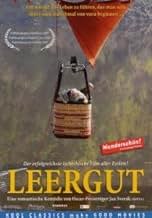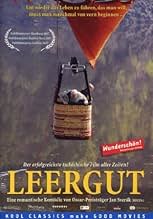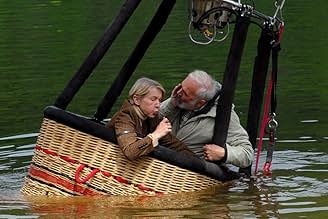IMDb-BEWERTUNG
7,2/10
5153
IHRE BEWERTUNG
Füge eine Handlung in deiner Sprache hinzuA comic love story about a man who refuses to accept that old age is empty of love, meaning and value to society.A comic love story about a man who refuses to accept that old age is empty of love, meaning and value to society.A comic love story about a man who refuses to accept that old age is empty of love, meaning and value to society.
- Auszeichnungen
- 10 Gewinne & 12 Nominierungen insgesamt
Tatiana Dyková
- Helenka
- (as Tatiana Vilhelmová)
Nela Boudová
- Ptácková
- (as Nella Boudová)
Empfohlene Bewertungen
The ideal viewers for this film are middle-aged couples. There is a good chance these couples will identify with the couple's story.
Joseph Tkaloun is a literature professor who teaches in a secondary school. He likes literature but has no more patience to deal with annoying and insolent teenagers. He is a dreamer and would like to work on activities that would connect him with real people. He retires from his teaching activities and tries several small jobs as a delivery boy, grocery clerk, etc.
Tkalounová, married for over 30 years with Joseph, teaches languages, is not a dreamer like her husband, and seems quite resigned to her little life between her household which includes also her daughter, recently separated from her respective husband, and her grandson.
The love life of Joseph and Tkalounová is stranded. Joseph has some recurring erotic fantasies which increase his interest in females, but he doesn't succeed to transmit his enthusiasm to his wife.
The daily routine of the couple goes on, punctuated by discussions at home, small jealousies from both sides, an unsuccessful attempt of infidelity from the part of Joseph, the emergence of an admirer of Tkalounová, a boyfriend that Joseph arrange for the daughter of the couple, etc.
Finally a happy end closes this trivial and "tanned" love story of this middle-age couple with surprise balloon ride.
A very nice movie that is really worth to be seen by viewers of middle age. I insist on the adjective middle-age because I think that young people will not understand the essential.
Joseph Tkaloun is a literature professor who teaches in a secondary school. He likes literature but has no more patience to deal with annoying and insolent teenagers. He is a dreamer and would like to work on activities that would connect him with real people. He retires from his teaching activities and tries several small jobs as a delivery boy, grocery clerk, etc.
Tkalounová, married for over 30 years with Joseph, teaches languages, is not a dreamer like her husband, and seems quite resigned to her little life between her household which includes also her daughter, recently separated from her respective husband, and her grandson.
The love life of Joseph and Tkalounová is stranded. Joseph has some recurring erotic fantasies which increase his interest in females, but he doesn't succeed to transmit his enthusiasm to his wife.
The daily routine of the couple goes on, punctuated by discussions at home, small jealousies from both sides, an unsuccessful attempt of infidelity from the part of Joseph, the emergence of an admirer of Tkalounová, a boyfriend that Joseph arrange for the daughter of the couple, etc.
Finally a happy end closes this trivial and "tanned" love story of this middle-age couple with surprise balloon ride.
A very nice movie that is really worth to be seen by viewers of middle age. I insist on the adjective middle-age because I think that young people will not understand the essential.
9ruuk
Vratné Lahve (written by Zdenek Sverák, directed by Jan Sverák) Father and son. Ten years ago they made film together, it became tremendously successful and won an Oscar. That was Kolya. After that they tried to tell the story of Czech RAF fighters during WW2, which was not so successful, mainly because of the historical, somewhat pathetic theme. Now they are back. After years and years of rewriting the script, son finally accepted his father's work and made it into film, which may be very well theirs best.
Main character Tkaloun (played by Zdenek Sverák) is an nervous, over-aged basic school teacher living with his slowly resigning wife and struggling to find a new way of life for himself after he leaves his teaching job. When he accepts new work in a supermarket as clerk responsible for storing empty glass bottles, he finds (and shows us) that it is never too late for being kind to other people and for life itself.
This film is very funny and moving - in a best way possible. It is also almost ultimately believable, as every scene and every bit of the dialog is taken from life. Audience in the theater started laughing shortly after the beginning and continued throughout the film till the final credits. Everyone was leaving the screening with a great smile on the face, filled with pleasant thoughts.
I don't know when it will hit the theaters abroad or in rest of Europe. But when it does, be sure not to miss it.
9/10
Main character Tkaloun (played by Zdenek Sverák) is an nervous, over-aged basic school teacher living with his slowly resigning wife and struggling to find a new way of life for himself after he leaves his teaching job. When he accepts new work in a supermarket as clerk responsible for storing empty glass bottles, he finds (and shows us) that it is never too late for being kind to other people and for life itself.
This film is very funny and moving - in a best way possible. It is also almost ultimately believable, as every scene and every bit of the dialog is taken from life. Audience in the theater started laughing shortly after the beginning and continued throughout the film till the final credits. Everyone was leaving the screening with a great smile on the face, filled with pleasant thoughts.
I don't know when it will hit the theaters abroad or in rest of Europe. But when it does, be sure not to miss it.
9/10
Vratné lahve (2007), directed by Jan Sverák, written by Zdenek Sverák, was shown in the U.S. with the title "Empties." The title derives from a second "career," undertaken late in life, by the protagonist Josef (Zdenek Sverák). Josef resigns from his position as a teacher and takes a job accepting returned glass bottles at a supermarket. Complications ensue. Josef isn't exactly an ideal worker, but he does establish a rapport with his fellow employees and with some of the customers.
Josef is married, but he and his wife are tired of each other. (Incidentally, his wife is played by Daniela Kolárová, who looks like the Czech Hellen Mirren.) Josef and his wife are both contemplating adultery, although that's not as easy for them as it might sound.
"Empties" is a comedy, but a comedy with a sad and bitter undertone. Everyone is looking for love, romance, and understanding, but mostly they're looking in the wrong places. Still, the film is worth seeing, especially because of the wonderful acting by Zdenek Sverák, who was outstanding in the film "Kolya" ten years ago, and is equally outstanding in "Empties."
Incidentally, the identical names of the actor/writer and director are not coincidental--they are father and son. That must lead to some interesting moments on the set.
We saw this film at the Rochester High Falls International Film Festival. It will work pretty well on a small screen. It's definitely worth seeking out and seeing.
Josef is married, but he and his wife are tired of each other. (Incidentally, his wife is played by Daniela Kolárová, who looks like the Czech Hellen Mirren.) Josef and his wife are both contemplating adultery, although that's not as easy for them as it might sound.
"Empties" is a comedy, but a comedy with a sad and bitter undertone. Everyone is looking for love, romance, and understanding, but mostly they're looking in the wrong places. Still, the film is worth seeing, especially because of the wonderful acting by Zdenek Sverák, who was outstanding in the film "Kolya" ten years ago, and is equally outstanding in "Empties."
Incidentally, the identical names of the actor/writer and director are not coincidental--they are father and son. That must lead to some interesting moments on the set.
We saw this film at the Rochester High Falls International Film Festival. It will work pretty well on a small screen. It's definitely worth seeking out and seeing.
Czech filmmaker Jan Sverak takes long breaks in between projects, and this is only his second feature film after the Academy Award winning "Kolya" (1996). Again, the film is a collaboration between Jan Sverak the director, and his father Zdenek Sverak, who returns to deliver another memorable leading role. The older Sverak also wrote the film, which becomes more and more evident as the movie goes on.
Zdenek plays a teacher of literature, who is let go of his job, because he can't connect with the modern generation. Though a man in his 60's, he can't bring himself to stay put at home, where the only thing waiting for him is a dull marriage with his wife, who is a German language home-school tutor. So after trying a few things, Zdenek ends up getting a job at a market, where people return the empty bottles to his counter. This is where the English title "Empties" stems from in a literal sense, though it also references the individuals depicted in the film. The old man dreams of younger women and tries to fight against the bottle returning machine, that threatens to replace him at his job.
What the Sveraks have made for us is a feel good movie, one where things improve slowly but surely. It is not plot-heavy at all, nor does it feel dramatic or strenuous as a viewing experience. It is a film, that works well for older demographics. It is lively, but has nothing too shocking in it. The main character's situation may be melancholy at times, but it's not too brooding. The film goes for both funny, and contemplative moments, and in the end, it's a fairly working mix.
For myself, a younger viewer, it's a little too obvious that the film is written by an older man, who worries about what the younger generation has become. The details of the societal depiction are oft-used almost to a point of being cliches. The opening of the film, where Zdenek's character tries to explain a poem to a class of uncaring millenials sets the scene in a black and white manner, and later, the criticism of technology too is simplified and lacks weight. The film is also very loose and light-weight, as films for older people often are. This means that the political commentary wears off and all you are left with is film, that passes the time nicely, even though it's more amusing than actually funny.
What I liked best about "Vratne lahve" was the market scenes, since they carried this Kaurismäki vibe, that worked well for the narrative. Also the acting is great. The characters played by Zdenek Sverak are always a required taste, but after a while, you find some endearing elements about this protagonist too. The supporting cast is also very good. What I liked least about this film was a quick "Kolya" related fourth wall break, since it took me out of the film emotionally. (Then again, if you compare the societal depictions of the two films, you amaze how much the Czech society has changed in the last few decades, which justifies the feeling of modernity being a burden). Also the last scenes did not really conclude the narrative in a functioning way.
Zdenek plays a teacher of literature, who is let go of his job, because he can't connect with the modern generation. Though a man in his 60's, he can't bring himself to stay put at home, where the only thing waiting for him is a dull marriage with his wife, who is a German language home-school tutor. So after trying a few things, Zdenek ends up getting a job at a market, where people return the empty bottles to his counter. This is where the English title "Empties" stems from in a literal sense, though it also references the individuals depicted in the film. The old man dreams of younger women and tries to fight against the bottle returning machine, that threatens to replace him at his job.
What the Sveraks have made for us is a feel good movie, one where things improve slowly but surely. It is not plot-heavy at all, nor does it feel dramatic or strenuous as a viewing experience. It is a film, that works well for older demographics. It is lively, but has nothing too shocking in it. The main character's situation may be melancholy at times, but it's not too brooding. The film goes for both funny, and contemplative moments, and in the end, it's a fairly working mix.
For myself, a younger viewer, it's a little too obvious that the film is written by an older man, who worries about what the younger generation has become. The details of the societal depiction are oft-used almost to a point of being cliches. The opening of the film, where Zdenek's character tries to explain a poem to a class of uncaring millenials sets the scene in a black and white manner, and later, the criticism of technology too is simplified and lacks weight. The film is also very loose and light-weight, as films for older people often are. This means that the political commentary wears off and all you are left with is film, that passes the time nicely, even though it's more amusing than actually funny.
What I liked best about "Vratne lahve" was the market scenes, since they carried this Kaurismäki vibe, that worked well for the narrative. Also the acting is great. The characters played by Zdenek Sverak are always a required taste, but after a while, you find some endearing elements about this protagonist too. The supporting cast is also very good. What I liked least about this film was a quick "Kolya" related fourth wall break, since it took me out of the film emotionally. (Then again, if you compare the societal depictions of the two films, you amaze how much the Czech society has changed in the last few decades, which justifies the feeling of modernity being a burden). Also the last scenes did not really conclude the narrative in a functioning way.
In my opinion, this title is good, but not excellent. I've seen many Czech films, and this is just another one with just a little change in motive. It doesn't make you think when you step up from cinema, it just makes you realize, what is happening in our world. The script is fine, but not innovative. There is no mystery and therefor no excitement at the end of the movie. Open ending that doesn't make you think is not a good ending in my opinion. Not an excellent directing is shown in this title, it just follows the script and doesn't adds artistic feeling into it. In motive i find very similar "Stesti", "Samotari". This movies are also about life and when you see them you just realize that this something similar and not new. Even though my score is low, this movie is not a waste of time. Especially if you are not a Slovakian or Czech. Go and see this movie for your self. If you are not very demanding spectator you will probably like this movie very much.
Wusstest du schon
- WissenswertesIn the film there is visible a TV program with a highlighted film Kolya (1996), made by the same duo: Jan Sverák (director) and Zdenek Sverák (writer and a main character in both, a father of Jan).
- PatzerEliska is supposed to be a professional teacher of German, yet in the German sentences she speaks in the course of the movie, her German has a heavy Czech accent, much worse than that of her supposed student. And, when Eliska is asked to translate the sentence, "I work for the city administration," her German translation makes no grammatic sense ("an der Stadtamt").
- VerbindungenReferenced in Comeback: Lexa a porno (2008)
Top-Auswahl
Melde dich zum Bewerten an und greife auf die Watchlist für personalisierte Empfehlungen zu.
- How long is Empties?Powered by Alexa
Details
Box Office
- Weltweiter Bruttoertrag
- 9.864.149 $
- Laufzeit1 Stunde 44 Minuten
- Farbe
- Sound-Mix
- Seitenverhältnis
- 1.85 : 1
Zu dieser Seite beitragen
Bearbeitung vorschlagen oder fehlenden Inhalt hinzufügen






































